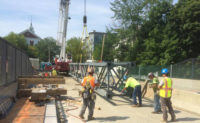A federal district court judge in Pensacola, Fla., has ruled that Skanska USA was negligent in preparing the Pensacola Bay Bridge construction site for the approach of Hurricane Sally, a September 2020 event that caused dozens of construction barges to break free of their moorings. The barges severely damaged the partly finished new crossing, closing it for months, and later washed ashore on nearby waterfront properties.
The decision clears the way for about 1,000 lawsuits filed against the contractor to proceed.
Skanska, which was building a parallel structure to the three-mile bridge completed in 2019 as part of a $430-million Florida Dept. of Transportation contract, claimed that it had taken all reasonable precautions to secure the site given original forecasts of Sally making landfall up to 200 miles away. Those measures included securing 55 construction barges to pipe pilings located at various mooring stations in the open waters of Pensacola Bay, most located 500 ft from the bridge.
A last-minute eastward shift that brought the hurricane’s eye about 35 miles west of Pensacola occurred less than 48 hours before landfall—too late to safely move the barges to Butcherpen Cove, the demobilization location identified in the firm’s contractually mandated hurricane plan. The company contended during court testimony that the cove remained vulnerable to the high waves that would ultimately free 27 of the barges from their moorings, scattering them uncontrolled into the churning bay.
The verdict 'is not supported by the evidence or testimony presented at trial' and the company 'took all appropriate measures' prior to the hurricane given the information available at the time.
—Skanska USA statement
An unknown number of vessels struck the existing bridge at multiple locations, completely severing some spans and forcing an eight-month closure for repairs. One barge floated far enough into the Pensacola Bay to pose a threat to the I-10 Escambia Bay Bridge, resulting in its temporary closure until the vessel was captured.
The lawsuits filed against Skanska so far involve claims of financial hardship as a result of damage inflicted by the barges—both to the bridge and other properties—as well as the fact that the partly completed bridge had to be closed to traffic. The contractor had sought to limit its liability under maritime law, which forced the issues involved to be tried first in federal court.
U.S. District Court Judge Lacey A. Collier conducted a four-day trial in Pensacola that concluded Oct. 22.
In his ruling issued Dec. 29, Collier rejected Skanska’s assertion that it had taken reasonable care to secure the barges, and that it was caught off guard by Sally’s change in direction and intensity. Collier noted that the potential of tropical storm conditions had been forecast for the Pensacola area for some time, and presented conditions that under the company’s hurricane plan directed that the barges be relocated.
“While Pensacola may not have been the most likely recipient of a direct strike during the time Skanska made its decision, the threat of tropical force winds remained a distinct possibility,” Collier wrote. “It is difficult to accept Skanska’s expression of surprise over the turn of events when at the time the Pensacola Bay area was under a tropical storm warning and a hurricane watch.”
In addition, Collier cited testimony from expert witnesses and Skanska executives that stated the pilings used for mooring the barges were more exposed to storm surge from the Gulf. Wave heights at the bridge reached up to 7.37 ft. That was more than twice the height of those recorded at Butcherpen Cove, which Collier ruled was “a far superior location for the barges, and the failure to utilize it, absent any other excuse, constitutes negligence.”
Judge: Damage Not Inevitable
Because Skanska’s negligence “sprung wholly from executive decision-making that resulted in the failure to take reasonable measures to protect its barges” from Hurricane Sally, Collier rejected the company’s use of a vis major defense, that the damage was inevitable, and that maritime law limited the its financial liability for damage sustained from the loose barges to the vessels’ total value of $1.2 million.
While Skanska has yet to announce whether it will appeal the decision, the company said in a statement that it is “extremely disappointed in the ruling, as we believe it is not supported by the evidence or testimony presented at trial.”
The statement reiterates Skanska’s contention that “it took all appropriate measures with the information available at the time to prepare for the storm. Immediately following the storm, [the firm] put forth its full resources to address the damage as quickly and as safely as possible and reconnect the communities impacted.”





Post a comment to this article
Report Abusive Comment